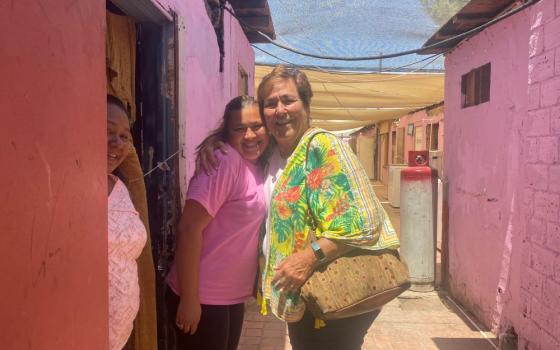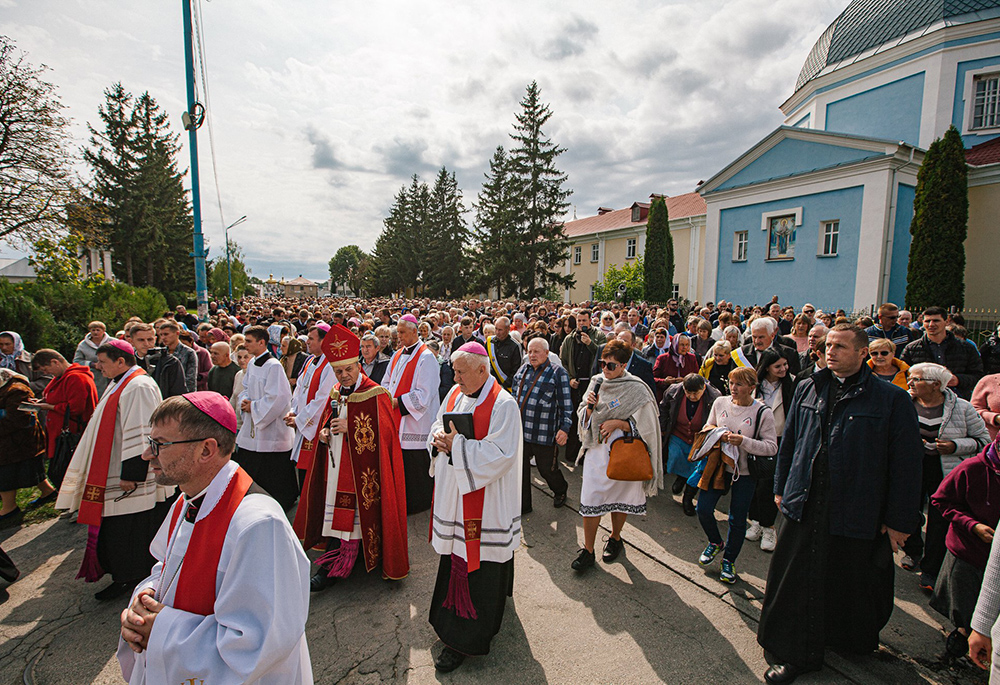
Bishops Leon Dubrawskyi of Kamianets-Podilskyi, wearing red vestments, and Stanislav Szyrokoradiuk of Odesa-Simferopol, center, lead a procession in Shargorod, Ukraine, Sept. 14, 2022, the special day of prayer for Ukraine and the end of the Latin-rite bishops' Year of the Holy Cross. (CNS/Vyacheslav Sokolovy)
On the edge of Zaporizhzhia in southeastern Ukraine, barely 30 miles from frontline positions in the war with Russia, a vast cemetery sprawls over former agricultural land, festooned with fluttering flowers and national flags.
When Donald Trump was sworn in as U.S. president on Jan. 20, there were fears in places like this of cutbacks in lifesaving Western support.
With those fears now realized in a dismantling of the US Agency for International Development, or USAID, many Ukrainians are struggling to stay upbeat about their tortured country's chances over the coming year.
"We're happy President Trump insists he's fighting for Christian values, including the defense of unborn children and families based on men and women — and we deeply hope he'll continue standing in our defense," said Auxiliary Bishop Jan Sobilo of Kharkiv-Zaporizhzhia, whose Catholic diocese straddles the eastern war zone. "We also know he's a believing person, and we're confident God will guide his decisions. But there've been real fears about policy changes, given what he's said in the past."
The bishop spoke with NCR ahead of the Feb. 3 confirmation by U.S. officials that USAID, founded in 1961, would be merged with the State Department and there would be considerable cuts to the agency's workforce, raising existential alarm among aid recipients worldwide. This follows Trump's order to freeze the majority of U.S. foreign aid on Jan. 20.
The move came after Russia's president Vladimir Putin rejected negotiations with the Ukrainian president, Volodymyr Zelenskyy, but declared himself open to talks with Trump and as Moscow continued targeting energy and infrastructure facilities across Ukraine, while its forces ground on with their bloody, protracted offensive along the country's 930-mile frontline.
Meanwhile, across Ukraine in the embattled Black Sea port of Odessa, anxiety about the new U.S. president's decisions were voiced by another Catholic prelate.
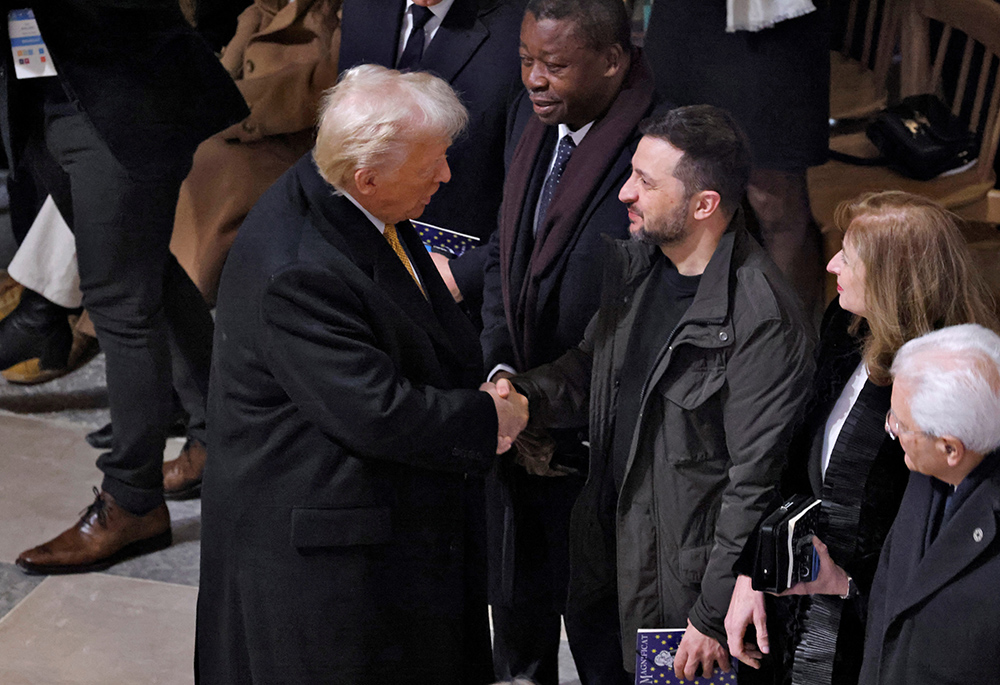
U.S. President-elect Donald Trump and Ukrainian President Volodymyr Zelenskyy shake hands inside Notre Dame Cathedral ahead of a ceremony to mark its re-opening following the 2019 fire, in Paris, Dec. 7, 2024. (OSV News/Ludovic Marin/pool via Reuters)
"Since he's untypical and unpredictable, it's been feared he may do something no one expects. But if God has allowed such a person to obtain power, he must have some plan for him," Bishop Stanislav Szyrokoradiuk of Odessa-Simferopol, told NCR. "Though we're prepared for uncertainties, we also hope he'll remain firm in telling black from white — that Ukraine is the victim, and Putin the aggressor and criminal."
Both church leaders were readying themselves for a planned national day of prayer on Feb. 24, the third anniversary of Russia's full-scale invasion, an event which shattered Europe's stability and triggered its biggest conflict since World War II.
Although no agreed data exist for Russian military losses, these could run as high as 700,000, while Ukraine's were put by Zelenskyy in December at 43,000 soldiers killed in action and 370,000 wounded. As for civilian casualties, these were verified by the United Nations last autumn at over 12,000 dead and 27,000 injured. The U.N. has warned, however, that real numbers could be much higher, as Russia pounds population centers and curbs rights in territories under its occupation.
Against this background, the sudden closure of USAID, which has so far provided Ukraine with about $37.6 billion in humanitarian aid, development assistance and direct budget support, could prove a devastating blow.
On its now-suspended website, USAID says its support, allocated by Congress, is "pivotal to Ukraine’s economic and democratic future," and also strengthens "the foundation for Ukraine's Euro-Atlantic integration."
"The U.S. government remains committed to the Ukrainian people as they continue to defend themselves from Putin’s onslaught," the agency pledges. "Autocrats around the world are watching whether the United States, its allies, and partners can sustain such resolve. Putin's war of aggression against Ukraine must not succeed."
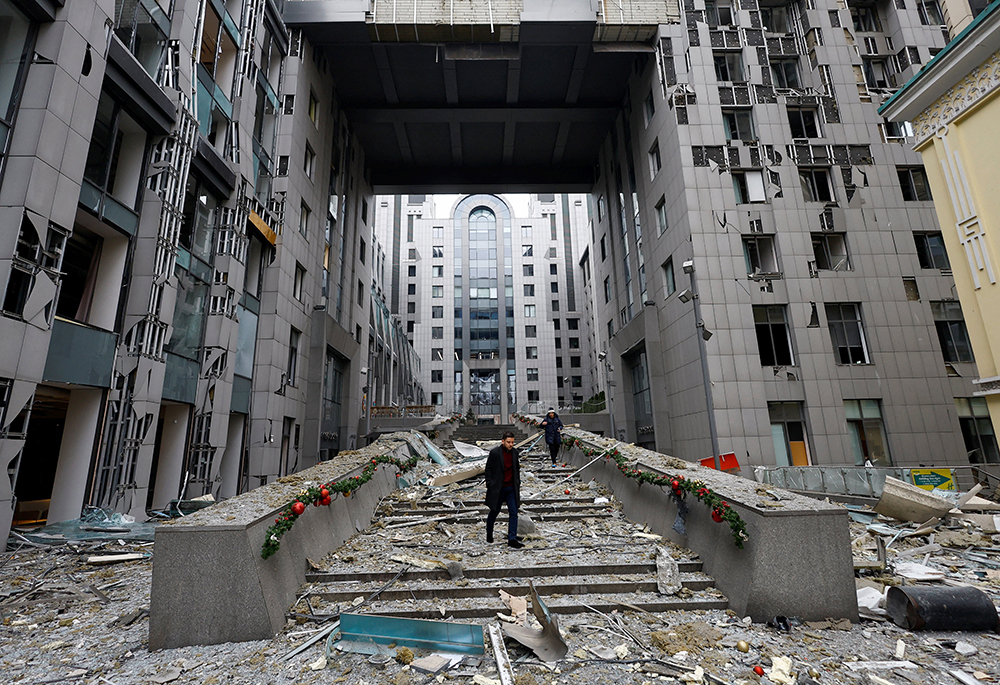
People walk at the site of a Russian missile strike near St. Nicholas Catholic Church on Dec. 20, 2024, in Kyiv, Ukraine, amid Russia's attack on Ukraine. According to the church's rector, Fr. Pavlo Vyshkovsky, cited by the Religious Information Service of Ukraine, the windows in the church's towers were blown out and the stained glass windows were shattered. (OSV News/Reuters/Valentyn Ogirenko)
"Yet no notice was given to us about this week's decision, and we're deeply concerned. If it's carried through, it will have enormously harmful consequences for us," Fr. Wojciech Stasiewicz, director of the Catholic Caritas-Spes aid organization in the war-damaged city of Kharkiv, told NCR. "International support, especially from the U.S., has enabled Ukraine to defend itself. If all aid is now cut off, this will be unimaginable, raising questions about who will help our country in future."
With Ukraine facing public exhaustion and manpower shortages, as well as diminishing international interest, Trump's campaign pledges to end the war immediately after taking office have also caused confusion and concern.
"It's our hope too that it may be possible to end the war this year. However, there are many illusions in the world about how this should be done," Major Archbishop Sviatoslav Shevchuk of Kyiv-Halych, whose Ukrainian Greek Catholic Church combines the eastern rite with loyalty to Rome, said in January. "With our enemy seeking to interfere in every state's internal affairs, the wrong way to stop this evil will be to let it into our minds. ... Evil shouldn't be appeased — it can only be stopped."
In a separate January appeal, over 160 Ukrainian public figures also urged world leaders not to make the mistake of "appeasing the aggressor" by requiring "territorial and sovereignty concessions" from Ukraine in a bid to freeze the conflict.
"Sustainable peace will only come when, under combined pressure from Ukraine and its allies, Russia faces a systemic crisis and the defeat of Putin's regime," said the appeal, co-signed by politicians, academics and civil society activists, as well as prominent Christians. "Russia's defeat in its war of aggression will re-establish an order based on rules and interdependence between responsible players. The security of global trade, nuclear energy and food security will all be strengthened."
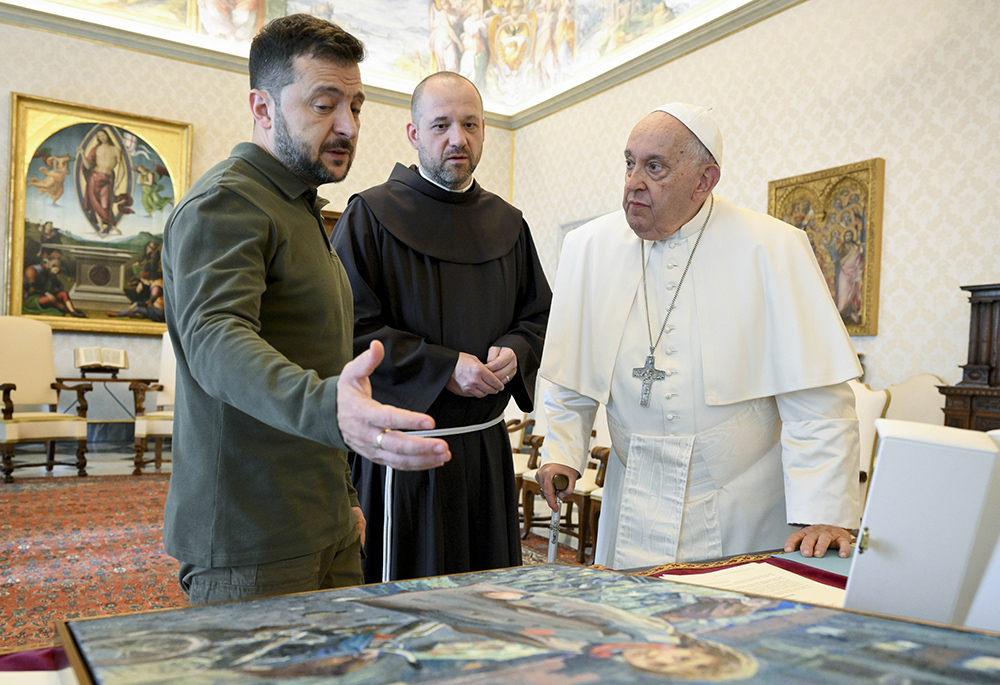
Ukrainian President Volodymyr Zelenskyy presents Pope Francis with a gift during a meeting Oct. 11, 2024, at the Vatican. (CNS/Vatican Media)
One move that's already worried churches has been the halting of Uniting for Ukraine, or U4U, a federal program allowing displaced Ukrainians a two-year stay in the U.S.
The program's suspension, under a Jan. 20 presidential decree, was confirmed by the U.S. Citizenship and Immigration Service, and will stand until "all categorical parole processes"are reviewed.
In war-damaged Zaporizhzhia, Sobilo hopes moves like this will only be temporary. He counts on Ukrainian organizations in the U.S. to continue speaking up in defense of their countrymen, as "hard-working people escaping from war."
Szyrokoradiuk agrees.
Ukrainians should be "deeply grateful," he said, for the shelter and protection already offered them.
"We can't expect to receive help and do nothing for ourselves and we shouldn't be surprised by this decision," the Odessa-based bishop told NCR. "But Ukrainians have already worked hard to integrate and find jobs in countries giving them asylum, so I also hope this is just a temporary, technical decision, which will soon be amended."
For now, the anxieties continue.
Meeting in January with Ukraine's prime minister, Denys Shmyhal, representatives of the European Union, G7 countries and international financial institutions pledged "unwavering support" for Ukraine, while Moscow's "historical revisionism, false claims and illegitimate demands" were condemned by the European Parliament, which called on Western governments to extend their sanctions.
At the end of January, the EU's High Representative for Foreign Affairs and Security Policy, Estonian politician Kaja Kallas, concurred with the new U.S. Secretary of State, Marco Rubio, on "the need to keep maximum pressure on Russia" for "a just and sustainable peace in Ukraine."
Advertisement
However, Trump's offers of talks with Putin have left many Ukrainians fearful of what might be arranged over their heads. The latest cutoff in aid projects looks set to compound these misgivings.
"Fellow-citizens hope your presidency will mark a just end to the Russian global threat, armed aggression and state-sponsored terrorism, which is a reality not only for Ukraine, but for the rest of the democratic world," a group of U.S.-based Ukrainian church leaders told the president in a message.
"We believe you will be able not only to stop the war, but also to hold the Russian leadership accountable for its numerous war crimes, the genocide of Ukrainians and crimes against humanity."
Szyrokoradiuk thinks the strong voice of Ukrainian churches will remain crucial.
A new survey by Kyiv's Razumkov Centre, published on Jan. 29, suggested the proportion of Ukrainians identifying as Orthodox had fallen from 70% to 55% in a decade, amid bitter conflict between the new Orthodox Church of Ukraine, formed in 2019, and its Moscow-linked rival — with 18% now disclaiming any direct religious affiliation.
The country's Catholic minority had increased, however, reaching around 13%, while overall public trust for churches remained high at 62.5%.
With aid raid sirens constantly warning of missiles and drones in and around Odessa, and deaths now outstripping births nearly threefold across Ukraine, Szyrokoradiuk hopes the wisdom and experience of Christian communities will help deter "naive expectations" of any easy road to peace.
"This war is crushing everything, and much of my time is taken up conducting funerals, as we try, despite all difficulties, to sustain morale," the bishop told NCR.
"Having received so much help already, we count on Western Catholics to argue our case. As for those thinking something might now be gained through talks with Putin, our answer is simple: Will anyone ever again trust what's said by this Kremlin devil, who just spouts lies and does what he wants?"
In Kharkiv, just 30 miles from the Russian border, Stasiewicz, the Caritas-Spes director, also hopes Western Catholics will continue doing what they can, not least through prayers and moral support.
His Catholic charity has helped the neediest families and elderly people in small villages and settlements close to the shifting frontline, who make up most of the war's victims. If its finances are suddenly cut, tens of thousands of people, many homeless and bereaved, will be deprived of support.
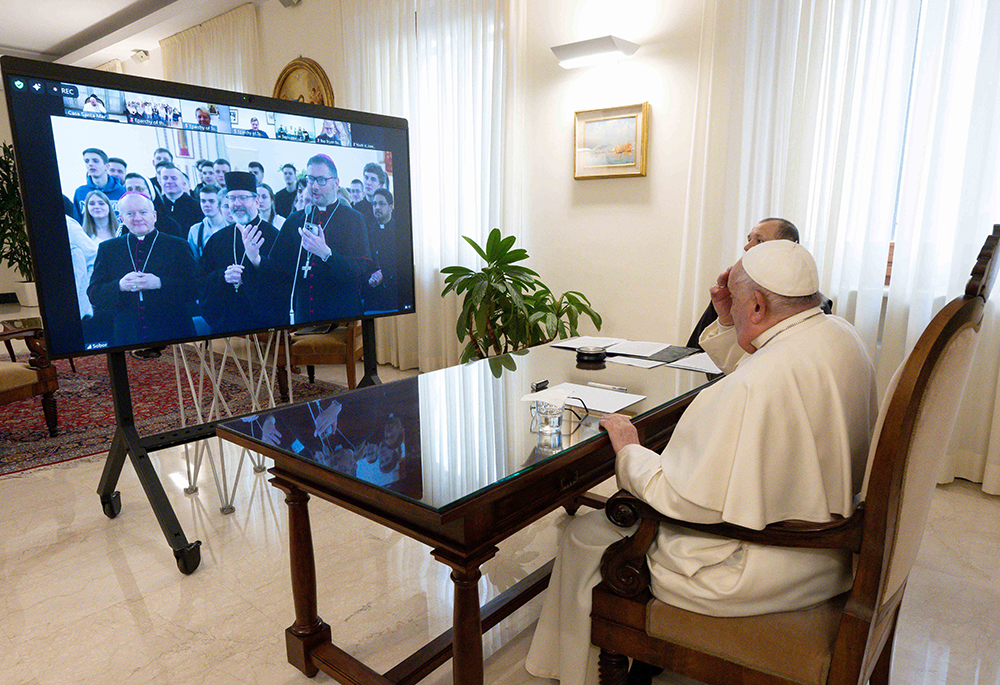
Pope Francis speaks with Major Archbishop Sviatoslav Shevchuk of Kyiv-Halych, head of the Ukrainian Greek Catholic Church, Auxiliary Bishop Jan Sobilo of Kharkiv-Zaporizhzhia, and Archbishop Visvaldas Kulbokas, nuncio to Ukraine, during a video call with young people gathered in the Ukrainian Greek Catholic Cathedral of the Resurrection in Kyiv, on Feb. 1, 2025. (CNS/Vatican Media)
"We're shocked and alarmed. No warning was given, and we've been left worrying about what will happen if our projects are terminated over the coming months," Stasiewicz, who also heads Kharkiv's Catholic parish, told NCR. "We've been living the church's current Jubilee Year since February 2022, hoping God will end this war and bring peace. All we can do now is ask Catholics everywhere not to forget about our suffering, tormented country, and to pray we survive these terrible times."
Further south, new graves are appearing daily at the vast windswept cemetery outside Zaporizhzhia, where a mass strike by 330 guided aerial bombs and drones killed at least 13 civilians and wounded at least 113 on Jan. 9.
In his annual address to diplomats the same day, Pope Francis deplored the worsening attacks on civilian targets, which he said had left children "freezing to death" as hospitals and energy supplies were destroyed.
In an online address on Feb. 1, Francis urged young Ukrainian Catholics to stay patriotic and love and protect their homeland.
While Sobilo is grateful for the pontiff's words, he himself narrowly escaped death when his own car was destroyed during a snow blizzard early in January. Like others, he relies on continuing Western support as Ukraine's fight for survival continues.
"Whatever Trump does, we can only pray his interventions may still bring closer the blessings of peace," he said.





